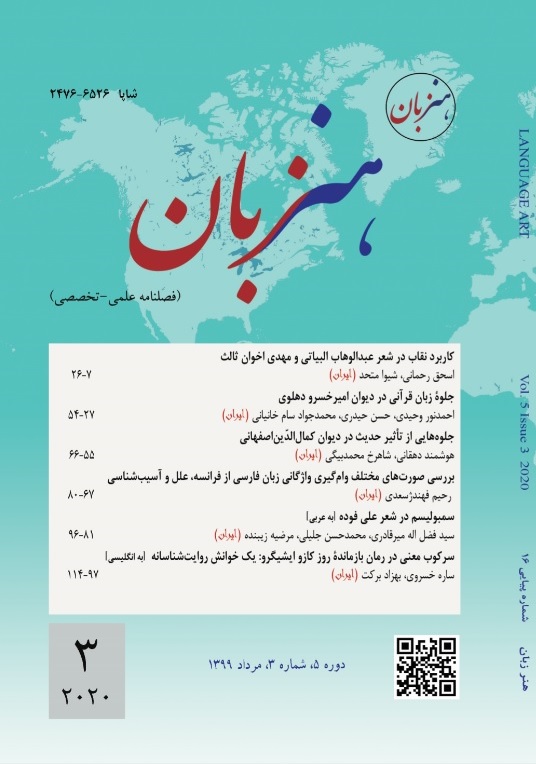جلوة زبان قرآنی در دیوان امیرخسرو دهلوی
DOI::
https://doi.org/10.22046/LA.2020.14کلمات کلیدی:
امیرخسرو دهلوی، آیات قرآن، بدیع، اقتباس، تلمیح، نظامالدین اولیاء، چشتیه، هندچکیده
اگر بخواهیم انواع استفادههایی را که گویندگان و نویسندگان مسلمان –و بویژه ایرانی- از قرآن مجید و احادیث معصومان بیان کردهاند ذکر کنیم، باید یک دوره بدیع و معانی و بیان تألیف کنیم، زیراکه تقریباً هیچیک از مباحث معانی و بیان و صنایع لفظی و معنوی بدیع را نمیتوان یاد کرد که علمای ادب تازی و پارسی برای آن مبحث، مثالی از قرآن مجید و حدیث رسول اکرم(ص) و سخنان امامان معصوم ذکر نکرده باشند. شاعران و نویسندگان صاحبنام ادب فارسی، توفیق داشتهاند که پارهای از تراوشات ذهنی و فکری خود را بهصورت تلمیح، اشاره، اقتباس و... به کلام وحی آراسته و تبرک نموده و بااینشیوه آن آثار را ماندگار کنند. بیشک راز جاودانگی زبان و ادب فارسی هم در پیوند با معانی ازلی و نغز قرآن است. قرآن، این کتاب آسمانی، بر آراستگی سخن شاعران افزوده و آن را زیبا و پرمعناتر کردهاست. امیرخسرو دهلوی(651-725ه.ق) پرآوازهترین شاعر پارسیگوی هند است که بازتاب قرآن در دیوانش بسیار چشمگیر است. او مناصب مهم حکومتی نیز در دربار شاعران و امیران هند داشتهاست و از جمله کسانی بود که به سلسلة چشتیه وابستهبود و از جوانی به خدمت نظامالدین اولیاء که درآن زمان از مشایخ نامدار دهلی بود پیوست. او آثار منظوم و منثور فراوانی به زبان فارسی، در سرزمین هند، از خود به یادگار نهادهاست، که دراین آثار علاوهبر نمایش زیباییهای زبان فارسی، به آیات و اشارات قرآنی و احادیث نبوی نیز پرداختهاست. دراین پژوهش سعی برآن است که بازتاب آیات قرآن در دیوان امیرخسرو دهلوی نشان داده شود.مراجع
Quran Karim
Alimahmoudi, O., Nourian, S., Fesharaki, M. (2017). The study of allusion and adapted Qur'anic and Hadith themes in Amir Khosrow Dehlawi’s "Noh Sepehr Mathnavi (Mathnavi of the Nine Skies)". Literary Arts, 9(2), 33-52. doi: 10.22108/liar.2017.21767
Amirkhosrow, khosrow ibn Mahmud (2012). divan amir khosrow dehlawi. Corrected by Saeed Nafisi. Rereading and editing by Mohammad Beheshti. Tehran: Sanaei publishing
Arya, Gholamali (1986). tarigh-ye chashtiyeh dar hend va pakistān va khadāmat-e peyruwāne in tarighe be farhange eslāmi va irani. Tehran: zawwar publishing.
Bahrampour, Abulfazl (2011). tafsir yek jeldy mubein. Awaye Quran publishing (3 edition)
Halabi, Ali Asghar (2000). tasire Quran va hadith dar adabiyāt-e fārsi. Tehran: Asatir publishing
Hujjati kermani, Ali (1997). daramadi bar tarikh va ulum-e Quran. Tehran: mashal-e daneshjo publishing
Khazaeli, Muhammad (2013). elāme Quran. Tehran: amirkabir publishing
Makarem Shirazi, Naser (2008). tafsire nemuneh. Vol. 9. Tehran. Dar al-kutub al'islamiyat. (36 eddition )
Nezami, Ahmad ibn Umar (2001). ĉārmaqāleh. Tehran: āmirkabir publishing
Qanbari Adiwi, Abbas (2004). hadith-e eʃq. Shahrekurd: Morwarid publishing
Rokni, Mohammadmehdi (2004). latāyefi az Quran karim. Mashhad: Behnashr (asatan qods razawi publishing).
Sanaei, Majdood ibn Adam (2015). hadiqat alhaqiqat wa shariat altariqa. Edited by Mohammad Taqi Modarres Razavi. Tehran: University of Tehran Press. (Eighth edition).
Yahaqqi, Muhammad Jafar (2015). farhange asātir va dāstānwārehā dar adabiyāt-e fārsi. Tehran: Farahange Moasir publishing. (5eddition).
Zarrinkoob, Abdolhosein (2010). bā karwane helleh. Tehran: elmi publishing
##submission.downloads##
چاپ شده
ارجاع به مقاله
شماره
نوع مقاله
مجوز
حق نشر 2020 احمدنور وحیدی, حسن حیدری, محمدجواد سام خانیانی

این پروژه تحت مجوز بین المللی Creative Commons Attribution 4.0 می باشد.
فصلنامه هنر زبان یک مجله دسترسی آزاد است و مقالات پس از پذیرش در دسترس عموم قرار می گیرند و استفاده از آن با ذکر منبع آزاد است
